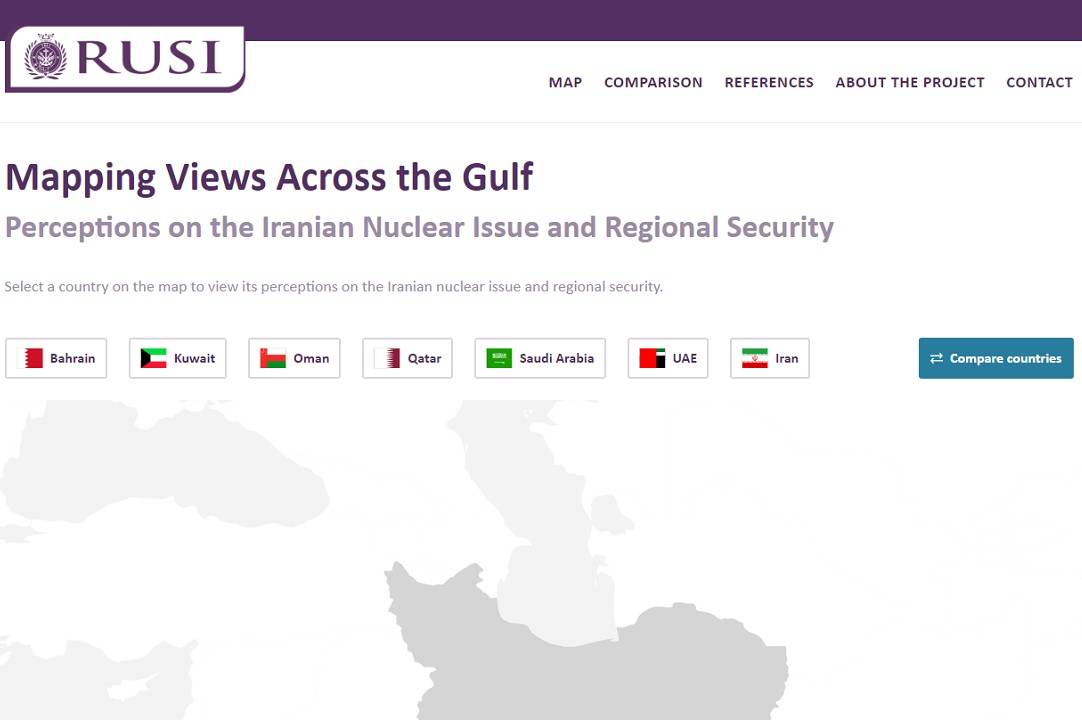Chain Reactions: The Iranian Nuclear Programme and Gulf Security Dynamics
This paper examines the perceptions of Iran and the six GCC states of the interaction between the Iranian nuclear issue and regional security dynamics in the Gulf.
This paper endeavours to capture the perspectives of Iran and the six Gulf Cooperation Council (GCC) member states on the interactions between the Iranian nuclear programme, international nuclear diplomacy with Iran, and regional security in the Gulf and the wider Middle East. The authors examine the interaction of these issues in the context of the Joint Comprehensive Plan of Action (JCPOA, colloquially known as the Iran nuclear deal), concluded between Iran and the P5+1 (the UK, the US, France, Germany, Russia and China) in 2015, and the negotiations to revive the agreement in 2021 and 2022. The paper seeks to inform policymakers – especially, but not only, in London – and support the articulation of policies that address UK and Western concerns over Iran’s nuclear ambitions while also being compatible with stated objectives of supporting stability and security in the Gulf region.
The research for this paper is based on 44 semi-structured interviews with subject matter experts and current and former government officials from Iran, the GCC states, the US and Europe, conducted between July 2021 and March 2022. Key findings are listed below.
On Mutual Perceptions Between Iran and the GCC States
- Each GCC state has its own distinct bilateral relationship with, and perception of, Iran – and vice versa. While all GCC states see Iran as a key source of regional instability, the perceptions of the importance of the threat posed by Tehran, as well as of the Islamic Republic’s objectives, vary across the GCC states.
- For Iran, the GCC states, and ultimately only Saudi Arabia and the UAE, constitute a secondary threat to national security and regional interests, and primarily by virtue of their defence and security relations with the US and Israel.
On Perceptions of Iran’s Nuclear Programme and Related Diplomacy
- The Iranian nuclear programme plays a secondary role in the GCC states’ threat perceptions vis-à-vis Iran, behind concerns over Tehran’s missile and drone programmes, and its network of non-state actor allies.
- The GCC monarchies do not regard Iran’s nuclear activities as being driven by regional security dynamics, but rather by Tehran’s relationship with Western powers – namely, the US – and, to a lesser degree, Israel. Nevertheless, the Gulf states assess that a nuclear deterrent would further embolden Iran and increase its destabilising activity in the region.
- Some of the GCC monarchies, especially Saudi Arabia, fear that the resolution of the Iran nuclear issue will be used by the US and other Western powers as an excuse to disengage from the region.
- The GCC states do not accept a military resolution of the Iranian nuclear issue and fear that a collapse of nuclear diplomacy could lead to military conflict.
On Perceptions of the Role of Extra-Regional Actors in Regional Security
- All GCC states see an important role for extra-regional powers to play in regional security dynamics and many expressed anxiety over the perception of US and Western retrenchment from the region.
- On the other hand, Iran sees the involvement of foreign actors in the region as a key source of regional instability and a threat to its national security.
- The GCC states see the UK and European states as potentially valuable contributors to regional security, but perceive a lack of clarity on their willingness, ability and strategy for engagement.
- Both Iran and the GCC states harbour reservations about expanded engagement with China and especially Russia. However, economic and political isolation in the case of Iran and concerns over US retrenchment among the GCC states may mean that increasing cooperation with Moscow and Beijing becomes inevitable for both sides of the Gulf.
On Perceptions of Trust-Building and a Regional Security Framework
- Despite some recent de-escalatory tendencies in the Gulf, mutual trust between Iran and the GCC states remains low.
- Building trust through collaboration on cultural, religious, environmental or economic matters can provide some initial opportunities for improving relations between Iran and its Gulf neighbours. However, meaningful progress towards more regional stability requires tackling fundamental security concerns, where significant disagreements between Iran and the GCC states persist. For instance, the GCC states want Iran to respect the principles of sovereignty and non-interference in the region and to acknowledge its role in creating regional instability. Iran, however, regards its ‘forward defence’ strategy as essential to its national security.
Based on these findings, the authors put forward the following recommendations for UK policymakers, to be coordinated with allies in the US and Europe and considered alongside the full scope of UK, US and European interests – and limitations – in the Gulf region:
- The UK should take note of both the similarities and differences in the GCC states’ threat perceptions and relationships with Iran and with each other.
- The UK and its allies should clearly articulate and demonstrate their commitment to supporting regional security and regional diplomatic initiatives aimed at de-escalation and stabilisation, regardless of the outcomes of the JCPOA negotiations.
- There are limited prospects for a trust-based UK–Iran relationship; nevertheless, there may be scope for London to engage with Tehran on discrete issues through trusted channels.
- The UK should clearly articulate its objectives and strategy towards the Gulf region, ideally outlined in a strategy document or a ministerial statement.
- Non-security-related confidence-building measures should be supported, especially in the economic sphere, but the UK should not overestimate their impact on regional security dynamics.
- The UK should encourage its GCC partners to engage with Iran bilaterally while also supporting cross-GCC coordination on engagement with Tehran. Such regional engagement would remain in the UK’s interest, regardless of the outcome of international nuclear diplomacy with Iran.
Dr Tobias Borck
Senior Associate Fellow
Darya Dolzikova
Research Fellow
Proliferation and Nuclear Policy

